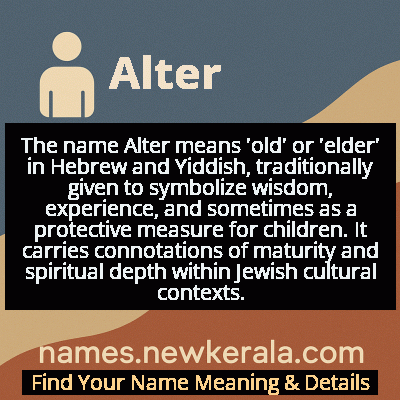Alter Name Meaning & Details
Origin, Popularity, Numerology Analysis & Name Meaning of Alter
Discover the origin, meaning, and cultural significance of the name ALTER. Delve into its historical roots and explore the lasting impact it has had on communities and traditions.
Name
Alter
Gender
Male
Origin
Hebrew
Lucky Number
2
Meaning of the Name - Alter
The name Alter means 'old' or 'elder' in Hebrew and Yiddish, traditionally given to symbolize wisdom, experience, and sometimes as a protective measure for children. It carries connotations of maturity and spiritual depth within Jewish cultural contexts.
Alter - Complete Numerology Analysis
Your Numerology Number
Based on Pythagorean Numerology System
Ruling Planet
Moon
Positive Nature
Diplomatic, friendly, artistic, empathetic.
Negative Traits
Over-sensitive, moody, indecisive, prone to self-pity.
Lucky Colours
Green, cream, white.
Lucky Days
Monday.
Lucky Stones
Pearl, moonstone.
Harmony Numbers
1, 3, 4.
Best Suited Professions
Diplomats, mediators, caregivers, artists.
What People Like About You
Cooperative spirit, friendliness, artistic talent.
Famous People Named Alter
Alter Kacyzne
Writer and Photographer
Prominent Yiddish writer and photographer who documented Jewish life in Eastern Europe
Alter Esselin
Poet
Influential Yiddish poet known for his lyrical and philosophical works
Alter Tepliker
Rabbi and Scholar
Renowned Hasidic rabbi and spiritual leader in Eastern European Jewish communities
Alter Druyanov
Writer and Editor
Noted Hebrew writer and folklorist who collected and preserved Jewish folk tales
Name Variations & International Equivalents
Click on blue names to explore their detailed meanings. Gray names with will be available soon.
Cultural & Historical Significance
The cultural significance of Alter extends beyond its literal meaning to encompass broader themes of continuity and tradition. In Jewish thought, elders are respected not merely for their age but for the wisdom they've accumulated, making Alter a name that speaks to the transmission of knowledge across generations. The name's usage in protective naming practices demonstrates how language and naming served as spiritual tools in Jewish folk tradition. Even in modern times, the name maintains its cultural resonance, connecting contemporary bearers to centuries of Jewish history and the enduring values of wisdom, experience, and spiritual protection that have characterized Jewish communities throughout the diaspora.
Extended Personality Analysis
Individuals named Alter are often perceived as possessing wisdom beyond their years, displaying a thoughtful and contemplative nature. They tend to be analytical thinkers who approach situations with careful consideration rather than impulsive reactions. This name suggests a person who values tradition and history, often serving as a bridge between past and present in their communities. Their inherent maturity frequently makes them natural counselors and trusted advisors, as others instinctively seek their guidance. Alter-named individuals typically exhibit strong observational skills and a deep understanding of human nature, allowing them to navigate complex social situations with grace and insight.
Beyond their intellectual qualities, those named Alter often demonstrate emotional depth and stability. They tend to be patient listeners who offer measured, thoughtful advice rather than quick judgments. Their calm demeanor and reliable nature make them pillars of strength in times of crisis. The name's connotations of age and experience seem to manifest in a personality that values quality over quantity in relationships, preferring deep, meaningful connections to superficial social networks. This combination of intellectual depth, emotional stability, and relational authenticity often positions Alter-named individuals as respected figures in their personal and professional circles, embodying the very qualities of wisdom and reliability that the name traditionally represents.
Modern Usage & Popularity
In contemporary times, the name Alter maintains its traditional usage within Orthodox and Hasidic Jewish communities, where it continues to honor the cultural practice of naming children with protective intentions. While not among the most popular names in mainstream Western society, it has seen a modest revival among Jewish families seeking to reconnect with their cultural heritage. The name's uniqueness and deep cultural roots appeal to parents looking for distinctive names with meaningful historical connections. In Israel, the name remains relatively uncommon but is recognized for its traditional significance. Among secular Jewish families and in broader multicultural contexts, Alter is sometimes chosen for its distinctive sound and the positive connotations of wisdom and experience it carries, though it remains primarily within Jewish naming traditions. The name's usage patterns reflect a balance between preserving cultural specificity and adapting to modern naming preferences that value uniqueness and meaningful heritage.
Symbolic & Spiritual Meanings
Symbolically, Alter represents the wisdom that comes with age and experience, serving as a metaphor for the accumulation of knowledge through life's journey. It embodies the concept of continuity between generations, acting as a bridge that connects past wisdom with present understanding. The name carries connotations of stability, reliability, and deep-rooted strength - qualities associated with ancient trees or enduring institutions. In a metaphorical sense, Alter suggests someone who serves as a living repository of cultural memory and traditional values. It also symbolizes protection and safeguarding, reflecting its original usage as a name given to protect children from harm. The symbolic weight of Alter extends to representing the idea that true wisdom often requires the perspective that only time and experience can provide, making it a name that speaks to patience, perseverance, and the gradual unfolding of understanding.

